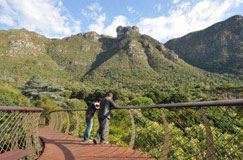Visitors flock to Cape Town's Kirstenbosch
23 February 2015
The Kirstenbosch National Botanical Garden in Cape Town attracted more than one
million visitors in 2014.
"The milestone achieved by Kirstenbosch is a tribute to the hard work and vision of
the South African National Biodiversity Institute (SANBI)," Tourism Minister Derek
Hanekom said 19 February, in announcing the visitor numbers.
Attaining this historic milestone had secured Kirstenbosch's status as one of the most
important tourist attractions in South Africa. Hanekom said South Africa's
conservation and biodiversity assets depended on tourism for its survival.
"The tourism footprint in conservation areas and botanical gardens generates the
income to support the sustainability of these assets."
SANParks – South African National Parks – generated 85% of its operational costs
through tourism revenue, while less than 1% of the Kruger National Park's two million
hectares was dedicated to tourism
infrastructure.
The income generated from tourism enabled SANParks, which manages the country's
wildlife reserves, to maintain its reputation as a world leader in the management of
protected areas. "The success of tourism underpins the sustainability of our
conservation efforts," Hanekom said.
Taleb Rifai, the secretary-general of the World Tourism Organization, a unit of the
United Nations (UNWTO), said tourism could be one of the effective tools used for
conservation by providing resources for environmental preservation and by raising
awareness among millions of people every year of the immense value of the country's
natural heritage and the responsibility to protect it.
SANBI chief executive Dr Tanya Abrahamse said Kirstenbosch was an example how
tourism and biodiversity could build a beneficial partnership and contribute to a more
sustainable economic model.
"Kirstenbosch is well-known as a 'must see' destination when planning a trip
to South
Africa, so when international tourism experts visit the country it's no surprise that
they would like to visit this iconic spot."
Source: SAnews.gov
 The treetop canopy walkway at Kirstenbosch National Botanical Garden in Cape Town (Photo: Adam Harrower, South African National Biodiversity Institute)
The treetop canopy walkway at Kirstenbosch National Botanical Garden in Cape Town (Photo: Adam Harrower, South African National Biodiversity Institute)
 The treetop canopy walkway at Kirstenbosch National Botanical Garden in Cape Town (Photo: Adam Harrower, South African National Biodiversity Institute)
The treetop canopy walkway at Kirstenbosch National Botanical Garden in Cape Town (Photo: Adam Harrower, South African National Biodiversity Institute)